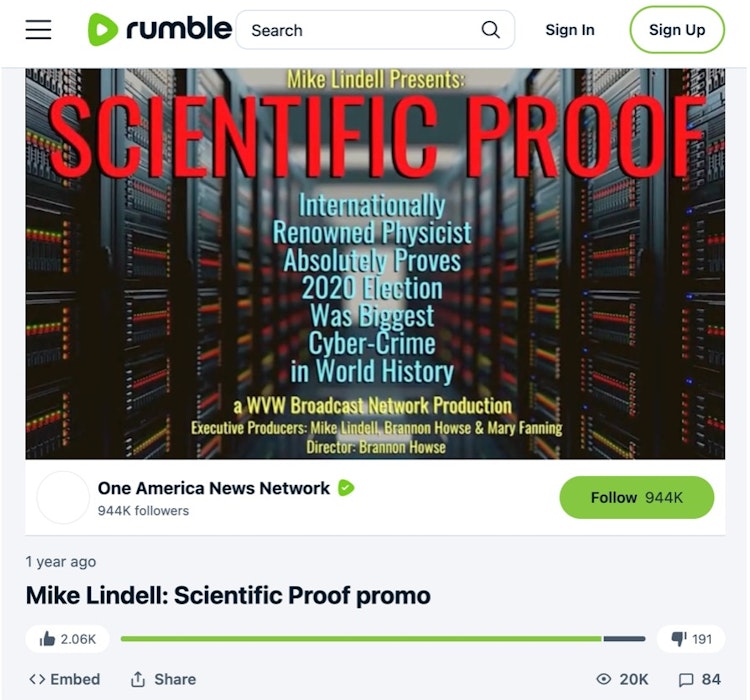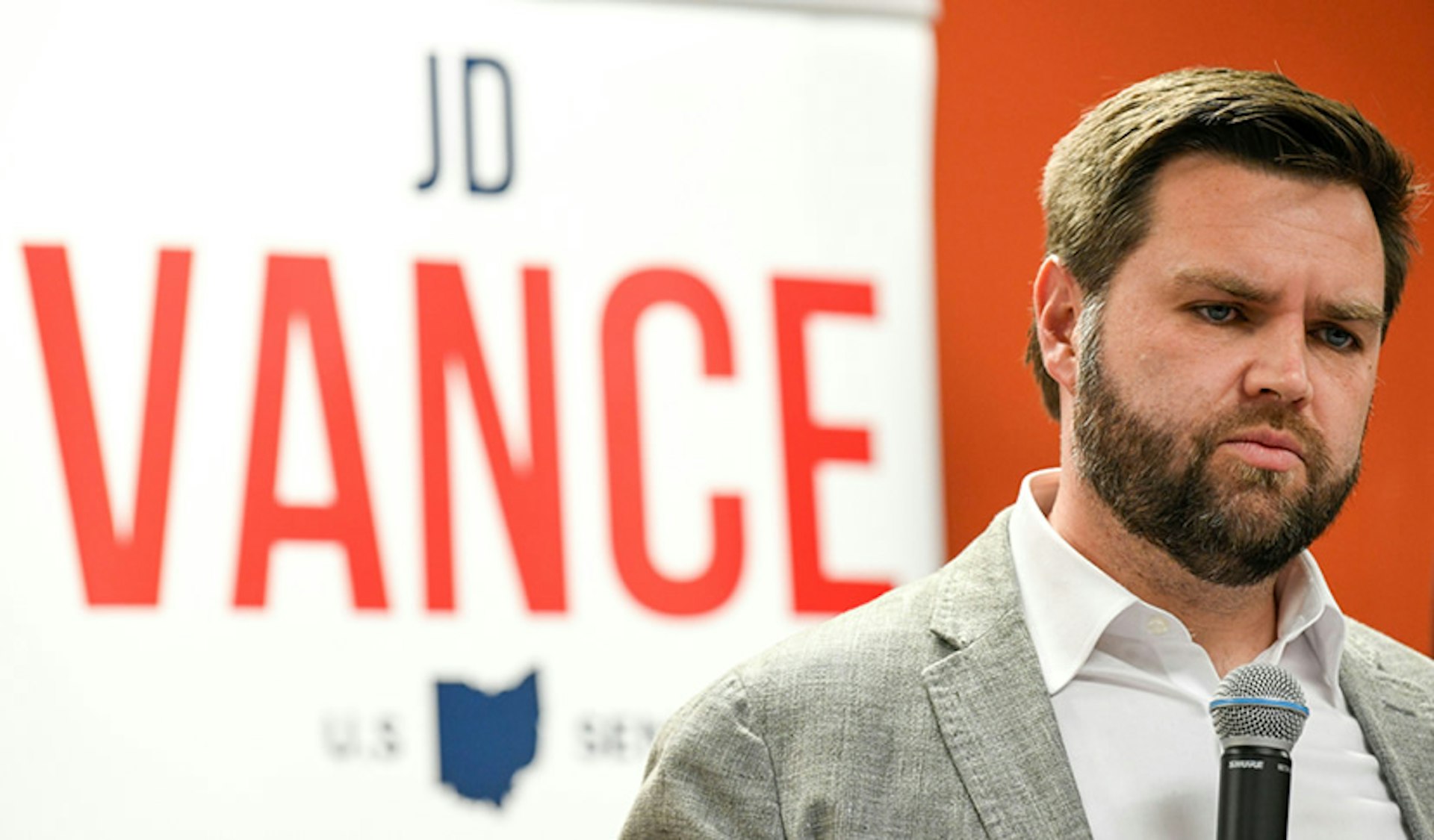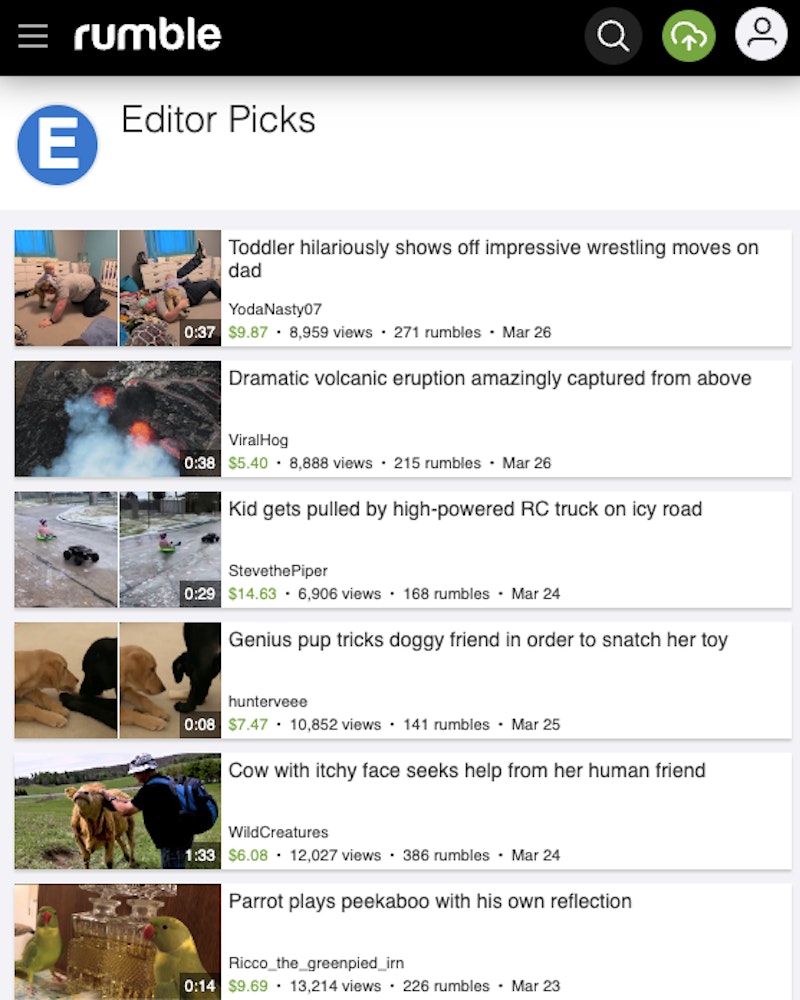Like many Republicans, newly elected Sen. J.D. Vance rails against Big Tech platforms, accusing them of censoring conservative views. But Vance has also proposed a notably self-serving plan for weakening the power of companies like Google and Facebook, the Tech Transparency Project (TTP) found.
During his Senate campaign, Vance called for a repeal of Section 230—the law that shields online platforms from legal responsibility for what users post on them—but only for “big tech companies.” He said this would protect smaller, “alternative” platforms, pointing to two examples that cater to right-wing users, former President Donald Trump’s Truth Social and Twitter clone Gettr.
“We need to reform it in a way that protects them, to protect new entries into this market, while destroying the stranglehold and the power of big tech,” Vance said.
Rumble—the right-wing alternative to YouTube that Vance has a personal financial stake in—could also benefit from this kind of 230 reform. Vance and his mentor, billionaire Peter Thiel, invested in Rumble in 2021, and the value of their stake likely grew substantially when Rumble became publicly traded through a SPAC deal last year. Vance also invested in LockerDome, now known as Decide, an ad-tech service that has served ads on Rumble.
Vance’s advocacy for selective reform of the tech industry’s liability shield—in a way that could benefit companies in his investment portfolio—adds to growing conflict-of-interest questions about the financial dealings of members of Congress. Rumble’s survival could hinge on holding onto its legal immunity, with politicians from Joe Biden to Donald Trump supporting a total repeal of Section 230.
Representatives of Vance and Rumble did not respond to requests for comment.
Significant investment
Chris Pavlovski, who launched Rumble in 2013 and serves as its CEO, has described the video platform as “neutral” and “immune from cancel culture.” It’s become a magnet for people on the right—and features personalities like right-wing commentator Dan Bongino, conspiracy theorist Alex Jones, and misogynistic “alpha male” influencer Andrew Tate, who have all been removed by YouTube for policy violations. Dubbed the “only success story in right-wing social media,” Rumble reported 80 million monthly active users in the fourth quarter of 2022, up 142% from the same quarter a year ago.
A venture capital firm co-founded by Vance called Narya Capital, Peter Thiel, and the family office of former Donald Trump advisor Darren Blanton invested in Rumble in May 2021. (Vance later described himself as Rumble’s first outside investor.) The Wall Street Journal, citing people familiar with the matter, called the investment significant and said it valued Rumble at roughly $500 million. Thiel, described by the Journal as Narya Capital's "anchor investor," has been increasingly active in Republican politics in recent years. A mentor and former boss to Vance, Thiel was the biggest contributor to pro-Vance super PAC during the election, donating $15 million.
Vance filed a personal financial disclosure (PFD) as a Senate candidate in November 2021 that stated he owned an interest in Rumble worth between $115,000 and $300,000 at the time. That range remained unchanged in another disclosure Vance filed in August 2022. A month later, Rumble was taken public through a merger with a special purpose acquisition company (SPAC). The deal valued Rumble at $2.1 billion.
Narya appears to remain invested in Rumble, given that one of its partners, Ethan Fallang, is still on the firm’s board. Narya’s website also continues to list Rumble as part of the firm’s portfolio. If Rumble was valued at $500 million at the time of Narya’s investment, and Vance’s interest in the company remains the same as when he filed his last financial disclosure, his stake today would be worth between $577,300 and $1.5 million, based on the company’s market capitalization of $2.51 billion at 1pm on April 10, 2023.
Rumble’s editorial slant began to change around the time of the Narya-Thiel investment, as the platform sought to exploit its increased popularity with right-wing users.
For example, in March 2021, the platform’s list of editor picks displayed no particular ideological bent and included videos of dogs, kittens, toddlers, and volcanos. By August 2021, three months after the Narya investment was announced, Rumble editors were promoting Glenn Greenwald, the fervent opponent of the U.S. left. By January 2022, they were promoting anti-vaccine content and hostile congressional questioning of Dr. Anthony Fauci, the then-chief medical advisor to President Biden. The list of editor picks in July 2022 was almost entirely composed of right-wing conspiracies and partisan attacks.
Rumble's editor picks in March 2021 consisted largely of children and animal videos.
Rumble's editor picks in March 2021 consisted largely of children and animal videos.
Vance’s financial stake in Rumble’s success extends beyond his direct investment in the company. According to Vance’s August 2022 PFD, he also owns between $1,000 and $15,000 in LockerDome, now known as Decide, a company that has served ads on Rumble.
One of Decide/LockerDome’s principal backers is venture capital firm Revolution’s Rise of the Rest Seed Fund, where Vance served as managing partner. The ad tech company has reportedly provided services for other right-wing conspiracy and disinformation sites like Gateway Pundit and World Net Daily.
‘Protect new entries’
Vance’s investment in Rumble received some attention during his Senate campaign, with his Democratic opponent, Tim Ryan, blasting Vance over Rumble’s publication of Russian propaganda on the Ukraine invasion.
But the issue of how Rumble—and by extension, Vance—could profit from Vance’s proposed changes to Section 230 of the Communications Decency Act has so far escaped media attention.
Thanks to the Section 230 provision, which was passed by Congress in 1996, platforms like YouTube, Twitter, and Facebook have been spared an avalanche of litigation over content posted by users, including defamatory statements, hate speech, and violent threats. This has cleared the way for the platforms to achieve enormous growth. Vance’s proposal, which he described at a March 2022 forum for Republican candidates in the Ohio Senate primary, would remove those protections for the big players while preserving them for new sites:
We just need to repeal Section 230 for any company of over a certain size. Now the reason I say “of a certain size” is because the big tech companies have an army of lawyers … They’re going to use that army of lawyers and that army of regulators and they’re going to destroy the new entrants. So President Trump’s new Truth Social, or GETTR, or any of the alternative platforms that we’re using, we need to reform it in a way that protects them, to protect new entries into this market, while destroying the stranglehold and the power of big tech.
Vance didn’t mention Rumble in that riff, but presumably the video platform, as one of the “new entrants” in the market, would also keep 230 protections under his plan. TTP found no examples of Vance publicly discussing 230’s impact on Rumble.
Lawmakers have floated a number of proposals in recent years for reforming Section 230 (including one, creating a liability carveout for sex trafficking content, that became law in 2018), but Vance’s proposal appears to be the only one that ties legal immunity exclusively to a platform’s size.
The only bill TTP could find that is similar to Vance’s concept was introduced by Republican Sen. Josh Hawley of Missouri. Hawley’s measure would remove Section 230 protections for companies that meet a certain threshold—30 million active monthly users in the U.S., 300 million active monthly users worldwide, or more than $500 million in global annual revenue—unless they pass audits that ensure their algorithms and content moderation practices are politically neutral. The bill, which Hawley introduced in June 2019 with no co-sponsors, failed to gain traction. (Hawley, like Vance, has received donations from Thiel.)
Litigation risks
Rumble acknowledges in investor disclosures that it benefits from Section 230 protections and could be affected by future changes to the law. The company states that “Section 230 of the Communications Decency Act generally limits Rumble’s liability for hosting tortious and otherwise illegal content” but that the “immunities conferred by Section 230 could be narrowed or eliminated through amendment, regulatory action or judicial interpretation.”
Vance’s 230 reform proposal could ensure that Rumble continues to enjoy that immunity, which is critical for the platform, given that it hosts and even promotes a significant amount of content that could subject it to costly litigation without the Section 230 liability shield.
For example, the Rumble-owned subscription platform Locals streams the movie 2000 Mules, which makes claims of widespread voter fraud in the 2020 presidential election that have been debunked by fact checkers. In October 2022, a person accused by the film of committing voter fraud filed a defamation lawsuit against various participants in the production and distribution of the film, but not Rumble. The movie’s producer and director, Dinesh D'Souza, said that the movie earned more than $3 million in five days through Rumble’s Locals platform.
Dominion Voting Systems, which has been the subject of baseless claims regarding rigged voting machines in the 2020 election, has also sued media organizations that posted such content on Rumble as well as media figures who made such claims in videos that eventually appeared on Rumble.
Dominion’s lawsuits against One America News Network (OAN) and My Pillow founder Mike Lindell repeatedly cite the election conspiracy documentary Absolute Proof, produced by Lindell and distributed by OAN, that Rumble users have posted to the platform multiple times. Dominion’s lawsuit against Lindell also cites a Right Side Broadcasting Network interview with Lindell, posted on Rumble, in which he said: “You’ve got to start with these corrupt machines … Because these things are embedded in these machines, but they were built to cheat. They were built to steal elections.” Lindell maintains an active channel on Rumble with 25,100 followers.
OAN used its Rumble channel to promote both Absolute Proof as well as a subsequent Lindell documentary called Scientific Proof. The promo for the latter claims a “computer algorithm was secretly deployed to steal the election from President Donald Trump,” citing an “internationally renowned physicist” who “absolutely proves [the] 2020 election was [the] biggest cyber-crime in world history.” But Dominion’s lawsuit against OAN states that this expert is actually “a part-time math teacher” who “had been put on a forced sabbatical by the school he previously taught at” and “admitted to the Ohio Secretary of State that ‘he does not currently possess any evidence to prove his theories about irregularities in the 2020 election.’”

Rumble also hosts uploads from Alex Jones, a broadcaster who owes $1.5 billion in judgments stemming from false statements he made about the 2012 massacre of children at Sandy Hook Elementary School in Newtown, Connecticut. Jones for years alleged the attack was a government false flag operation involving “crisis actors.” Jones’ Rumble channel has 210,000 followers.
Another video on Rumble makes false claims about the 2022 attack on the husband of then-House Speaker Nancy Pelosi. The video from an account with 18,800 followers states that Paul Pelosi could not be the victim of an attack because he is currently being detained in Guantanamo Bay, Cuba, citing “sources” within the Navy’s Judge Advocate General's Corps.
One Rumble video made a series of false claims about Paul Pelosi, husband of former House Speaker Nancy Pelosi.
One Rumble video made a series of false claims about Paul Pelosi, husband of former House Speaker Nancy Pelosi.
Data harvesting
Vance unleashed a torrent of criticism against Big Tech during his Senate campaign, saying, among other things, “It’s time to break them up, it’s time to destroy them.” He took particular aim at the data collection practices of Google and other tech companies, warning, “Maybe we should make it illegal for them—or at least require disclosure—before they steal our data, before they harvest our data and then sell it back to us in the form of targeted advertising.”
But it appears that Rumble allows many of the same data practices that Vance has condemned as predatory. The company makes this disclosure in its privacy policy:
[W]e have relationships with advertising companies and [social networking sites], including Rumble's own Ad Manager, who may serve ads and/or collect certain information when you visit our web site. These advertising companies typically use a cookie, pixel, or third-party web beacon to collect this information. For example, these companies may use information collected about you (e.g., IP address, click stream information, browser type, time and date, subject of advertisements clicked or scrolled over) during your visits in order to provide advertisements about goods and services that may be of interest to you.
Rumble says it is developing its own “in-house advertising ecosystem” with the idea that, “eventually, all ads on the Rumble platform will be served through its own advertising system.” The company introduced a beta version of its ad platform “open to all verified businesses” in August 2022. Trump’s Truth Social joined as its first publisher.
But as it builds its ad platform, Rumble still relies heavily on Google’s advertising tools, which serve some of the ads on the Rumble website, TTP found. Clicking the information button on these Google ads reveals that they were presented to users based on factors such as “websites you’ve visited,” “the information on the website you were viewing,” and Google’s estimation of your interests, household income, and parental status.

Every Rumble video page that TTP analyzed also contained Google’s analytics code, which helps the platform and advertisers track user behavior and target ads more narrowly.
Rumble’s use of Google’s ad tools continues despite Vance’s critiques of Google’s targeted advertising practices. (Rumble is also pursuing an antitrust lawsuit against Google for “self-preferencing” its video search results in favor of YouTube.)
An investor prospectus ahead of Rumble’s SPAC deal revealed that for the quarter ended March 31, 2022, “approximately 56% of Rumble’s total revenue derived from two advertising networks, Google AdSense and Decide (formerly known as LockerDome).”









